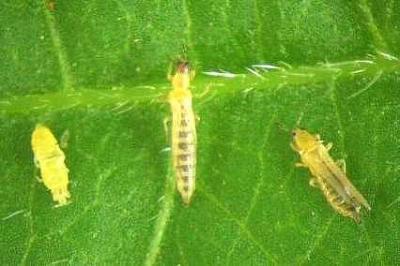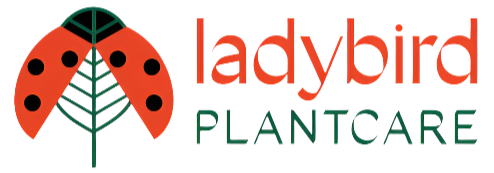A Quick Guide To Thrips
What are Thrips?
The most serious type of Thrips is the Western Flower Thrips, which can be orange, yellow and brown. Thrips can be called Thunder Bugs or by the name of the plant i.e. Gladioli Thrips. They have two sets of wings but they are folded against their body so cannot normally be seen. The insects are generally hidden inside flowers or in nooks and crannies, but can be seen by shaking the plant onto a sheet of white paper (easier with a hand lens).

What does thrips damage look like? The symptoms


Thrips are best spotted by looking for plant damage as the pest itself is very small and difficult to spot. They feed on the plant's sap, causing the flowers, fruit and foliage to be deformed, weakening the plant and eventually killing it.
You will see the leaf surface turning a silver colour spotted with black spots indicating cell death. Flowers may seem deformed with brown petals that may have ragged edges.
If they attack young emerging shoots then leaves may be crooked and misshapen. Unfortunately Thrips are also known to spread diseases.

How do you stop Thrips?
Thrips Treatments
Amblyseius predatory mites (Amblyseius cucumeris) are small enough to find and eat the younger life stages of thrips.
We supply sachets that you can hang on the branches of affected plants or prop against the stem. The mites crawl out of a hole on the back of the sachet and around the leaves and within the plant looking for the Thrips larvae. As it's the smallest/youngest larvae they eat we recommend repeat applications to keep the pest under control.
Working best in temperatures between 10°C – 27°C, the sachets contain grain mites which give the predators a source of food to stop them all emerging at once. Mites continue to emerge from sachets over several weeks and in much higher numbers than with a single broadcast release.
For more serious infestations we also sell tubes of 25,000 mites, an immediate and high dose of predatory mites. Good for quickly establishing a population of mites and providing an immediate defense for your plants.
Amblyseius mites can also feed on pollen which allows for effective, long term control.
Nematodes for Thrips
Used as a spray on foliage and on the soil surface, the nematodes swim through a film of water and attack female thrips. Larvae are not always attacked but pupae frequently are. These work best when applied 3 times leaving a 7 day gap between treatments.
Orius Thrips Killer
Orius laevigatus is the final frontier for fighting a Thrips infestation. We sell a mixture of 500 adults and nymphs to attack all stages of Thrips, one of the only biological control agents that is able to kill adult thrips.




